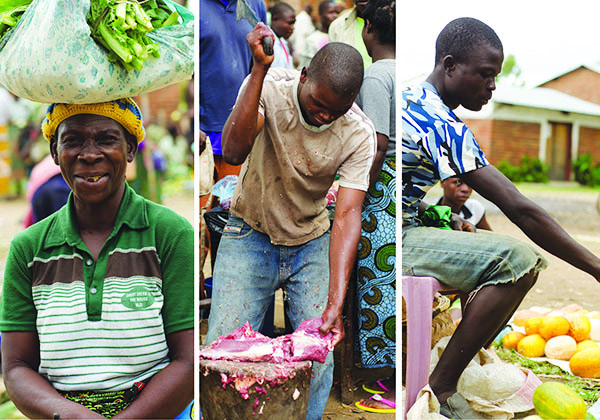The Multiplier Effect
If you are short of tomatoes, onions, or vegetables to make that stew you have been craving for – you are certainly guaranteed to find your desired ingredients at a Cash Transfer distribution site. Mobile money Cash Transfer distributions have brought increased income and created vibrant markets where vendors are selling goods ranging from fresh produce, meats and various household items. As a result, an economic multiplier effect has been created with numerous small traders/vendors benefitting. Beneficiaries can spend their funds using more localised markets, within closer proximity to their villages, all to the advantage of local vendors.
Save the Children’s Cash Transfer programme was developed using a new approach to humanitarian assistance and the need to address chronic food insecurity, which is a challenge many households in Malawi are facing. The programme provides beneficiaries with unconditional cash grants as an alternative to traditional relief handouts. The programme developed a working partnership with Airtel Malawi, a local telecommunications company, which was tasked to be facilitating electronic transfers of the grants to beneficiaries through its mobile money platform. Cash deliveries are organised at established cash distribution sites on scheduled dates – this mirrors a similar mobile money /e-transfer project implemented in Traditional Authorities (TAs) Mwambo and Chikowi in Zomba District. In that programme, a total of six cash transfer distributions took place between November 2013 and April 2014 with funding from the Department for International Development (DFID)

Whenever households involved in the programme obtain their money at distribution sites, they have the financial freedom to choose how they prioritize support to their families. This is termed a non-conditional cash grant. Local vendors sensing business opportunities have taken advantage by establishing conveniently located markets at each distribution site. “The benefit of having the market at the distribution centre is that I don’t have to walk a long distance to buy my goods,” said Ethel Chibandula from TA Mwambo, Zomba district after purchasing a bag of fresh vegetables from a vendor.
Distribution days are also great days for all vendors. Wyson Njala, a farmer and Chifuniro Kalowana, a butcher are both vendors who remarked that they sell more goods on Cash Transfer distribution dates. Wyson is able to sell three bags of cucumbers at the distribution markets compared to one bag every three days normally. Chifuniro manages to slaughter and sell two goats during distribution when normally he sells only half a goat on any other day.
There is a combined sense of joy and excitement for every one at these lively, fast paced markets. Cash Transfer crucially meets its goal of securing households with financial independence to partially meet their monthly basic food needs. It provides some respite to people’s food and economic security challenges, which is evident from their expressions as they walk about the market purchasing goods with an eminent freedom of choice. In turn, this flexibility of a non-conditional cash grant benefits the vendors, whilst bringing much economic stimulus to the local economy – thus creating a multiplier effect.
Written by,
Luzayo Nyirongo, Strategic Communications Officer
 Malawi
Malawi